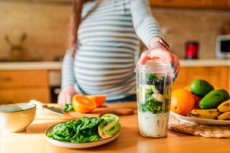New publications
Good Nutrition Linked to Better Sleep During Pregnancy
Last reviewed: 18.08.2025

All iLive content is medically reviewed or fact checked to ensure as much factual accuracy as possible.
We have strict sourcing guidelines and only link to reputable media sites, academic research institutions and, whenever possible, medically peer reviewed studies. Note that the numbers in parentheses ([1], [2], etc.) are clickable links to these studies.
If you feel that any of our content is inaccurate, out-of-date, or otherwise questionable, please select it and press Ctrl + Enter.

A prospective analysis of the nuMoM2b Sleep substudy was published in Current Developments in Nutrition: The higher the quality of the diet in pregnancy (as measured by the HEI-2005), the longer and better their sleep. The association remained after controlling for multiple factors. The study does not prove causation, but it adds weight to the “pregnancy plate” advice: more whole foods, vegetables, fruits, whole grains, fish, and dairy; less added sugar and ultra-processed foods.
Background
- Sleep is often disrupted during pregnancy, and it is not harmless. Insomnia, snoring/OSA, and sleep fragmentation increase during pregnancy; the disturbances are associated with an increased risk of hypertensive disorders, gestational diabetes, and other adverse outcomes.
- Diet and sleep interact in both directions, but data specifically for pregnancy are scarce. Reviews emphasize that despite the obvious clinical significance, there are few high-quality prospective studies on the relationship between diet quality and sleep in pregnant women - this is the current gap.
- The HEI is a recognized way to assess the "quality" of a diet. The Healthy Eating Index summarizes the diet's compliance with nutritional recommendations (0-100 points); the 2005 version of the HEI uses component counts by food group/nutrient.
- nuMoM2b is a large US cohort studying first-time pregnancy outcomes. The main sample includes ≈10,000 primiparous women; a dedicated nuMoM2b Sleep substudy has conducted objective sleep measurements (home breathing studies, questionnaires, actigraphy) and follow-up in thousands of participants. This infrastructure allows testing whether diet quality predicts sleep characteristics.
- What the new work covers. A prospective analysis in Current Developments in Nutrition tested whether high HEI-2005 is associated with sleep duration and quality during pregnancy, accounting for multiple confounding factors - filling the gap between disparate data on nutrition and sleep parameters in pregnant women.
- Practical context: If a "healthy" diet is confirmed to be associated with better sleep, this provides a safe, non-pharmacological intervention to reduce risks (GDM, hypertension) where both sleep and diet are modifiable factors.
What exactly did they do?
- They took participants from the American cohort nuMoM2b Sleep (Nulliparous Pregnancy Outcomes Study: Monitoring Mothers-to-Be), where sleep in pregnant women is measured and monitored prospectively.
- The quality of nutrition was assessed using the Healthy Eating Index (HEI-2005) - a total score showing how close the diet is to healthy eating recommendations.
- Main outcomes: sleep duration and quality during pregnancy; statistical models adjusted for potential confounding factors (age, BMI, etc.).
What did they find?
- Higher HEI = better sleep. Participants with higher diet quality had longer nights and better sleep quality scores. This is consistent with previous evidence linking “healthy” dietary patterns (DASH/Mediterranean) to better sleep overall and in pregnancy.
- The results fit into a picture where sleep and nutrition are linked in a two-way relationship: poor sleep worsens food choices, and a good diet helps stabilize sleep rhythms, blood sugar, and inflammatory processes that are important in gestation.
Why is this important?
- During pregnancy, sleep is shorter and worse, and this is associated with unfavorable outcomes (GDM, excessive weight gain, cesarean section, etc.). Any safe, non-drug methods to improve sleep are worth their weight in gold, and nutrition seems to be one of the levers here.
- The work adds prospective data: first assessing diet, then sleep. This is stronger than simple "slices" and closer to the reality of everyday recommendations.
How does this compare to previous research?
- Large reviews and meta-analyses show that better diet quality is associated with better sleep outcomes (less disruption, adequate duration). Similar signals have been found for pregnant women in Asia and Europe; the new study extends the findings to a larger American cohort.
Restrictions
- Observational study: improving HEI does not automatically "cure sleep." There may be residual confounding factors and reverse causality (better sleepers are better able to eat healthier).
- Assessment of both diet and some sleep parameters relies on questionnaires; this is better than nothing, but always less accurate than, say, actigraphy/polysomnography.
What can be done today
- Collect HEI points "the easy way": half a plate - vegetables/fruits, a quarter - whole grains, a quarter - protein (fish, legumes, poultry), plus dairy/fermented milk. Limit added sugar and ultra-processed foods.
- Maintain a sleep routine: regular hours, moderate dinner 2-3 hours before bed, caffeine before lunch. These behavioral steps go hand in hand with a “healthy plate” and potentiate the effect. (The link between poor sleep and obstetric risks is another incentive to pay attention to this.)
- All changes are in consultation with a doctor, taking into account toxicosis, anemia, gestational diabetes mellitus and other pregnancy features.
Source: Kahe K. et al. "Diet Quality and Sleep During Pregnancy - A Prospective Study in the nuMoM2b Sleep Cohort", Current Developments in Nutrition, May 2025 (open access). DOI: 10.1016/j.cdnut.2025.106150
